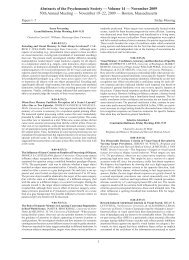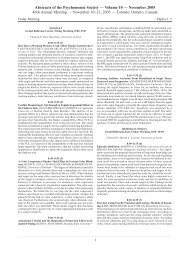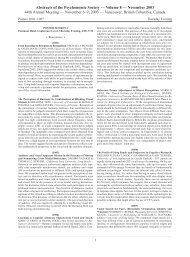S1 (FriAM 1-65) - The Psychonomic Society
S1 (FriAM 1-65) - The Psychonomic Society
S1 (FriAM 1-65) - The Psychonomic Society
You also want an ePaper? Increase the reach of your titles
YUMPU automatically turns print PDFs into web optimized ePapers that Google loves.
Posters 1069–1075 Thursday Evening<br />
(1069)<br />
Encoding Strategy and the Testing Effect in Free Recall. PETER<br />
P. J. L. VERKOEIJEN, Erasmus University Rotterdam, PETER F. DE-<br />
LANEY, University of North Carolina, Greensboro, & REMY M. J. P.<br />
RIKERS, Erasmus University Rotterdam (sponsored by Remy M. J. P.<br />
Rikers)—<strong>The</strong> testing effect refers to the phenomenon that taking an<br />
intermediate test benefits long-term retention more than restudying<br />
the material does. In the present study, we investigated the interaction<br />
between encoding strategy, retention interval, and testing effects. Participants<br />
studied a word list using a story strategy or a rehearsal strategy.<br />
Subsequently, they restudied the list or they received an intermediate<br />
free-recall test. <strong>The</strong>n, half of the participants received a final test<br />
after 5 min, whereas the other half received the final test after 1 week.<br />
When the final test was administered after 5 min, restudying yielded<br />
a better memory performance than testing. This held true for the story<br />
and the rehearsal strategy. Conversely, when the final test was given<br />
after 1 week, a testing effect was obtained in the story-strategy condition,<br />
whereas a reversed testing was found in the rehearsal-strategy<br />
condition. <strong>The</strong> theoretical and the practical implications of these findings<br />
are discussed.<br />
(1070)<br />
<strong>The</strong> Effects of Effort After Meaning on Recall. FRANKLIN M.<br />
ZAROMB & HENRY L. ROEDIGER III, Washington University (sponsored<br />
by Todd Braver)—Three experiments examined free recall of<br />
ambiguous sentences with and without corresponding cues to facilitate<br />
comprehension using Auble and Franks’s (1977) paradigm. Sentences<br />
were either studied without cues, with cues provided immediately<br />
beforehand, or with cues following a 2- or 6-sec interval delay.<br />
When the conditions were manipulated within subjects, puzzling over<br />
the meaning of sentences for several seconds prior to receiving the cue<br />
to aid comprehension enhanced veridical recall and reduced false recall.<br />
<strong>The</strong> memorial advantage associated with increasing the sentencecue<br />
delay did not occur when the cue presentation conditions were<br />
arranged in homogeneous sentence-blocks or manipulated between<br />
subjects. However, when instructions were changed to direct subjects<br />
to try to discern the meaning of sentences prior to receiving a cue, recall<br />
improved in both the between-subjects and blocked-sentence designs.<br />
Effort after meaning improves recall.<br />
(1071)<br />
Episodic Cuing: More Information Makes Worse Memory. ANDREA<br />
K. TAMPLIN & GABRIEL A. RADVANSKY, University of Notre<br />
Dame (sponsored by Gabriel A. Radvansky)—In three experiments,<br />
people were trained on general information, with accompanying<br />
unique episodic information, to choose an appropriate factory task or<br />
filing procedure. <strong>The</strong> learning task emphasized both the general and<br />
the episodic knowledge. After training, people were given task numbers/names,<br />
and were asked to recall the general information associated<br />
with these tasks. Findings suggest that while episodic cues aided<br />
memory in some cases, in others they made memory worse. Memory<br />
was generally improved with episodic cues when the traces were relatively<br />
weak, and harmed when memory traces were stronger. <strong>The</strong>se<br />
results are interpreted in the context of theories of focused and competitive<br />
memory retrieval. Specifically, providing an episodic cue may<br />
misdirect retrieval processes away from portions of memory containing<br />
the needed information, and there may even be suppression of<br />
noncued information.<br />
• WORKING MEMORY •<br />
(1072)<br />
Depth of Processing Differentially Affects Working Memory and<br />
Long-Term Memory. NATHAN S. ROSE, JOEL MYERSON, HENRY<br />
L. ROEDIGER III, & SANDRA HALE, Washington University—Two<br />
experiments compared the effects of depth of processing at encoding<br />
on working memory and long-term memory. Experiment 1 examined<br />
working memory performance on the levels-of-processing (LOP)<br />
61<br />
span task, a newly developed complex span procedure which involves<br />
processing to-be-remembered words on the basis of either their visual,<br />
phonological, or semantic characteristics. Using the LOP span task,<br />
Experiment 2 compared the effect of depth of processing at encoding<br />
on immediate serial recall with its effect on subsequent delayed recognition<br />
of the same items. Taken together, the results of the two experiments<br />
show that depth of processing has a minimal effect on working<br />
memory, but that even in the absence of an effect on immediate<br />
recall, there is a clear LOP effect on long-term memory for the same<br />
items. <strong>The</strong>se results are consistent with previous findings showing<br />
that working memory and long-term memory are fundamentally separable<br />
systems and provide strong support for dual-store memory<br />
models.<br />
(1073)<br />
<strong>The</strong> Utilization of Domain Knowledge to Expand Working Memory<br />
Capacity. TRAVIS R. RICKS & JENNIFER WILEY, University of<br />
Illinois, Chicago (sponsored by Jennifer Wiley)—To investigate how<br />
expertise improves working memory capacity (WMC), we completed<br />
a set of studies that extended the Fincher-Kiefer et al. (1988) findings<br />
that domain knowledge increased scores on domain-related span<br />
tasks, which we replicate in our Experiment 1. In our subsequent studies,<br />
we isolated whether the storage or processing components of span<br />
tasks were related to baseball. In Experiment 2, processing was related,<br />
but storage items were not. No effects were seen due to domain<br />
knowledge. In Experiment 3, storage was related but processing was not.<br />
Again there was no effect for knowledge. Only Experiment 4, where<br />
the storage items were related to baseball, and participants were explicitly<br />
informed of the baseball theme, found an effect for knowledge.<br />
This suggests that experts expand their WMC by utilizing domainrelated<br />
retrieval structures, but that they need to be aware of the relation<br />
between to-be-remembered items and their prior knowledge.<br />
(1074)<br />
<strong>The</strong> Negative Impact of Prior Reflective Selection is Sometimes<br />
Due to Target Enhancement. JULIE A. HIGGINS & MARCIA K.<br />
JOHNSON, Yale University—Briefly thinking of one item from an active<br />
set of semantically related items reduces accessibility of the nonselected<br />
items during subsequent processing. We test whether this reduced<br />
accessibility is due to target enhancement or to distractor<br />
suppression. Participants read aloud a word set containing three related<br />
category exemplars (one high, one medium, and one low associate).<br />
<strong>The</strong>n they either reread or thought of (refreshed) one of the<br />
words. Participants read the original set again before refreshing a second<br />
word from the set. Response times to refresh the second word<br />
were longer having just refreshed versus having just reread a word<br />
from the set. This increase was larger when the first word refreshed<br />
was a higher associate than when it was a lower associate. This pattern<br />
of results suggests that the negative impact of prior refreshing is<br />
due to enhanced activation of the refreshed item and not inhibition of<br />
the nonrefreshed items.<br />
(1075)<br />
Do Working Memories Decay? MARC G. BERMAN, JOHN<br />
JONIDES, LEE I. NEWMAN, & DEREK E. NEE, University of<br />
Michigan (sponsored by John Jonides)—We present data from a series<br />
of experiments exploring decay and interference in working memory.<br />
Utilizing an item-recognition task, we examined the degree to<br />
which previously seen stimuli interfered with item-recognition performance<br />
on current memoranda. <strong>The</strong> amount of time that separated<br />
previously seen items from current memoranda was manipulated from<br />
2 to 14 sec to determine whether working memories do in fact decay<br />
with the sheer passage of time. In addition, the amount of proactive<br />
interference (PI) that was aggregated over the course of the experiment<br />
was varied between studies to determine whether the amount of<br />
aggregated PI interacted with the amount of time-based decay. Lastly,<br />
we analyzed how the number of intervening trials modulated the interfering<br />
ability of previously seen items. Our preliminary results





